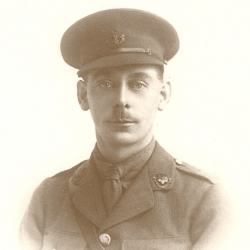Philip Sidney Marsden was born in April 1894 in Wigan. His father Joshua was clothier and Philip was the youngest of five children. Philip was educated at Mill Hill Boarding School in Hendon, London. He left Mill Hill in July 1911 and went on to study at the University of London.
He was commissioned into the 1/9th Battalion Manchester Regiment on September 2, 1914 (as supernumary) along with several others. He joined the Battalion while they were at Chesham Fold camp, Bury and sailed with them to Egypt in September 1914 serving with them there throughout their training and preparation for action. He landed with the 1/9th in Gallipoli on May 9, 1915 as the Officer in Command of the Machine Gun Section.
He was wounded in action on June 6th and evacuated to Cairo for treatment in Hospital where he remained for 72 days. He returned to the peninsula on August 17th and was made temporary Lieutenant immediately upon his return. He served with the Battalion until they left for Egypt on December 28, 1915.
While serving in Egypt he was able to take leave in the UK for the first time since leaving in September 1915. His leave was from May 8th to June 19th and he must have been glad to miss at least some of the summer heat in the Sinai. He took an additional 4 days leave in Cairo from November 26-30, 1916. He was promoted to Lieutenant on June 1, 1916.
He sailed with the Battalion to France, landing on March 11, 1917, and shortly after arriving there became ill and was treated in hospital for 3 weeks from April 21 to May 12. Rejoining in Templeux Quarries about 30 kilometers southwest of Havrincourt. On the evening on May 26 the 1/9th relieved the 1/5 East Lancs Regiment in the front line, Lieutenant Marsden leading D Company. Work concentrated on deepening the existing trenches in the front and support lines. Patrols were sent out on the evening of May 27th with orders to make it to the German lines, to assess the German positions, and were fired on by machine guns 600 or 700 yards from the Manchesters’ line.
In the early morning of May 30th the Battalion war diary has the following entry:
1:00am. Patrol composed of Lt. P.S. MARSDEN and 3 privates is fired on & Lt. P. S. MARSDEN and one of the men hit, both in the abdomen. The two remaining privates drag back the wounded Officer and man some distance and then obtain a stretcher and some assistance. Lt. P.S. MARSDSEN dies an hour after he is brought in and the private some hours later.
In fact, an article was published in the Ashton Reporter newspaper on July 7, 1917 that provided a slightly different account. Corporal 350351 Joseph Wilde’s family, killed in action on June 2nd, received a letter from Captain F.W. KERSHAW and Second Lieutenant ALFRED GRAY. Captain F.W. KERSHAW wrote:
“I cannot too highly praise your son. … Only a few days ago Lieutenant MARSDEN and Private FIELDING were hit out in front of our lines, and your son volunteered to go out and assist in bringing them in. He carried Private FIELDING back to our trenches, a distance of 300 yards, on his back. … He was buried with fitting ceremony in a British soldiers cemetery, near to Lieutenant MARSDEN, Private FIELDING, and Private ASHCROFT, who were killed about the same time.”
Lieutenant Philip Sydney Marsden was killed in action at Havrincourt Wood on May 30, 1917. He was 23 years old. He is buried in Neuville-Bourjonval British Cemetery alongside Private 350454 Tom Fielding. Corporal 350351 Joseph Wilde is buried close by, alongside Lance Corporal 350567 Thomas Ashcroft.

